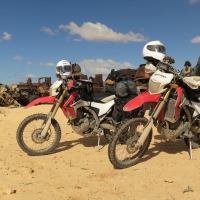 After Abdul Hamid and Ali bought us a full tank of fuel, we went on our way to the east towards Ajdabiya. The area through which we drive is dry with here and there some low vegetation. We again pass many oil refineries that, with access to the Mediterranean Sea, send the ‘black gold’ on to the world. The signs of the revolution are visible here. Along the way are countless burnt cars, especially pick-ups. The burn marks on the asphalt and the potholes made by bombing mean we have to pay a lot of attention on the road. At some point we see a row of tanks parked on a hill next to the road. It is clear that the tanks are no longer in use and have been put here after the revolution. We drive into the desert to take a closer look. The bullet casings lie scattered in the sand. It is an impressive sight. After an extensive photo shoot with the men in, on, behind and under the tanks, we continue our journey. It is not far to Ajdabiya anymore. The further we drive to the east, the more police checkpoints we encounter. At most checkpoint we can just drive on. If they stop us it is usually for a chat, to take pictures or to offer us some food or drinks. Most guys at the checkpoints are very young (“So young that they do not even have to shave”, according to Peter). If they hear our bikes they come running out of their booth while pulling their I-pod from their ears with one hand and putting on their camouflage shirt with the other hand. Only once we are asked for our passports by an older soldier. He also starts questioning us and wants to know whether we know the company that has sponsored us for our visa. The four of us all nod ’yes’.
After Abdul Hamid and Ali bought us a full tank of fuel, we went on our way to the east towards Ajdabiya. The area through which we drive is dry with here and there some low vegetation. We again pass many oil refineries that, with access to the Mediterranean Sea, send the ‘black gold’ on to the world. The signs of the revolution are visible here. Along the way are countless burnt cars, especially pick-ups. The burn marks on the asphalt and the potholes made by bombing mean we have to pay a lot of attention on the road. At some point we see a row of tanks parked on a hill next to the road. It is clear that the tanks are no longer in use and have been put here after the revolution. We drive into the desert to take a closer look. The bullet casings lie scattered in the sand. It is an impressive sight. After an extensive photo shoot with the men in, on, behind and under the tanks, we continue our journey. It is not far to Ajdabiya anymore. The further we drive to the east, the more police checkpoints we encounter. At most checkpoint we can just drive on. If they stop us it is usually for a chat, to take pictures or to offer us some food or drinks. Most guys at the checkpoints are very young (“So young that they do not even have to shave”, according to Peter). If they hear our bikes they come running out of their booth while pulling their I-pod from their ears with one hand and putting on their camouflage shirt with the other hand. Only once we are asked for our passports by an older soldier. He also starts questioning us and wants to know whether we know the company that has sponsored us for our visa. The four of us all nod ’yes’. 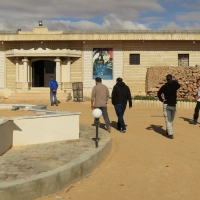 When we are stopped at one of the final checkpoints before Ajdabyia two Libyans (not military) walk up to us. “Where Peter?” asks one of them. Peter raises his hand and one of them walks up to him and introduces himself as Hamad. Peter had been in contact with Mustafa from Ajdabiya, whose telephone number he had received from Masoud (Zuwara). When Peter asks where Mustafa is, Hamad answers that Mustafa is a few kilometres further on waiting for us. We follow Hamad and indeed a few kilometres further on Mustafa is waiting for us at the entrance to the War Museum of Ajdabiya. He appears to have studied in Scotland and is now back in Libya since two months. He speaks good English and explains that they would like to show us the museum before we go to a hotel. That seems like a good idea. We park the bikes inside the fence of the museum and follow Mustafa, Hamad and their friend Fergany to one of the buildings on the site. Within the walls of the building are full of photos of the victims of the revolution. Most of them are “Freedom Fighters” who fought against the Gaddafi regime, but there are also pictures of women and children. In this museum only the victims who were killed in and around Ajdabiya and Benghazi are remembered. Ajdabiya was on of the first cities that revolted against Gaddafi. From there, revolts spread further across the country. In other parts of the country similar memorial walls can be found. There is a great number of photographs of officers. Each of them soldiers from the army of Gaddafi who switched to the Freedom Fighters. The men tell us amazing stories. About a man who crashed his car full of gas tanks into the entrance of the armory. The car exploded in which the man died, but the gate was open and made sure that the Freedom Fighters were able to obtain weapons. We also see pictures of journalists that have been killed by spies of Gaddafi after they had made reports on the revolution.
When we are stopped at one of the final checkpoints before Ajdabyia two Libyans (not military) walk up to us. “Where Peter?” asks one of them. Peter raises his hand and one of them walks up to him and introduces himself as Hamad. Peter had been in contact with Mustafa from Ajdabiya, whose telephone number he had received from Masoud (Zuwara). When Peter asks where Mustafa is, Hamad answers that Mustafa is a few kilometres further on waiting for us. We follow Hamad and indeed a few kilometres further on Mustafa is waiting for us at the entrance to the War Museum of Ajdabiya. He appears to have studied in Scotland and is now back in Libya since two months. He speaks good English and explains that they would like to show us the museum before we go to a hotel. That seems like a good idea. We park the bikes inside the fence of the museum and follow Mustafa, Hamad and their friend Fergany to one of the buildings on the site. Within the walls of the building are full of photos of the victims of the revolution. Most of them are “Freedom Fighters” who fought against the Gaddafi regime, but there are also pictures of women and children. In this museum only the victims who were killed in and around Ajdabiya and Benghazi are remembered. Ajdabiya was on of the first cities that revolted against Gaddafi. From there, revolts spread further across the country. In other parts of the country similar memorial walls can be found. There is a great number of photographs of officers. Each of them soldiers from the army of Gaddafi who switched to the Freedom Fighters. The men tell us amazing stories. About a man who crashed his car full of gas tanks into the entrance of the armory. The car exploded in which the man died, but the gate was open and made sure that the Freedom Fighters were able to obtain weapons. We also see pictures of journalists that have been killed by spies of Gaddafi after they had made reports on the revolution. 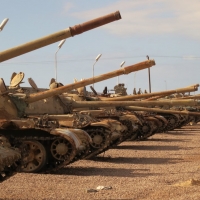 Then the men show us the outside area that is completely filled with tanks, tracked vehicles and burnt pick-ups. There is also a large amount of ammunition. The museum is still under construction and while we take a look at the fleet the main building is still being painted. If we come back to the motorbikes we are given drinks and cakes by the guards of the museum. They are happy that we came to visit the museum. Although the intention was to stay in a hotel, Hamad lets us know that he will bring us to a farm outside the city. This is safer for us, for the motorbikes and also much more comfortable. We follow the men towards Ajdabiya and park just outside the city in front of a metal gate. When the gate opens we drive into a large tiled courtyard with a beautiful landscaped garden with grass, shrubs and trees. Not a normal sight in an environment that mainly consists of desert sand. The site houses a number of buildings each of which has a bedroom and a bathroom. The main building also has a kitchen. It turns out to be the weekend house of Hamad. He has a house in the city where he lives with his wife and two kids. His immediate family live in the same neighbourhood in the middle of busy Ajdabiya. On weekends they stay here at the ‘farm’. Hamed explains that the ‘farm’ was used for the organization of the revolution, but was taken over by soldiers of Gaddafi later. The bullet holes in the door are still visible.
Then the men show us the outside area that is completely filled with tanks, tracked vehicles and burnt pick-ups. There is also a large amount of ammunition. The museum is still under construction and while we take a look at the fleet the main building is still being painted. If we come back to the motorbikes we are given drinks and cakes by the guards of the museum. They are happy that we came to visit the museum. Although the intention was to stay in a hotel, Hamad lets us know that he will bring us to a farm outside the city. This is safer for us, for the motorbikes and also much more comfortable. We follow the men towards Ajdabiya and park just outside the city in front of a metal gate. When the gate opens we drive into a large tiled courtyard with a beautiful landscaped garden with grass, shrubs and trees. Not a normal sight in an environment that mainly consists of desert sand. The site houses a number of buildings each of which has a bedroom and a bathroom. The main building also has a kitchen. It turns out to be the weekend house of Hamad. He has a house in the city where he lives with his wife and two kids. His immediate family live in the same neighbourhood in the middle of busy Ajdabiya. On weekends they stay here at the ‘farm’. Hamed explains that the ‘farm’ was used for the organization of the revolution, but was taken over by soldiers of Gaddafi later. The bullet holes in the door are still visible. 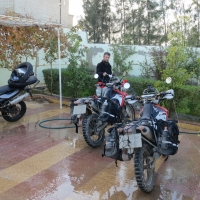 Hamad has taken his wife and children to family in Benghazi about 200km(!) away, so he could receive us and show us the city. He turns out to be an exceptionally welcoming host. When we are done unpacking the bikes, there is a table full of delicious food and drinks waiting for us. Crackers, cheese, olives, fruit and all kinds of drinks. As we walk to our bedroom to change even our beds already made. We enjoy the delicious snacks. It is still early in the afternoon, so we have plenty of time to work on the bikes. We are handed a water hose to clean the bikes. When everyone is done with their work on the bike, the men take us to the city. They want to show us Ajdabiya and get something to eat. Peter and I ask Mustafa if he can bring us to a shop where we can make photocopies of our passports (for the Egyptian border). Furthermore, we ask if we can do some shopping for the next day, on which we will drive over 400km through the desert to Tobruk to avoid Benghazi and Darnah. On that route are no villages and only one gas station halfway. It is however no certainty that they also have fuel, because we have already been to gas stations where they could not help because they had no electricity. So we need to bring both food and extra fuel the next day. If we can already buy that stuff today, we can leave early tomorrow morning so we will arrive in Tobruk before dark. No problem, according to Mustafa, everything can be bought in Ajdabiya. Peter and I ride along with Hamad and Fergany and Billy and Ross get in with Mustafa. They first take us to a Roman castle. Hamad and Fargany both speak ‘small English‘ as they say, so unfortunately we cannot have extensive conversations with them without help from Mustafa. As always a picture says more than a 1000 words so on the way we look with admiration at the pictures of the daughters of Hamad.
Hamad has taken his wife and children to family in Benghazi about 200km(!) away, so he could receive us and show us the city. He turns out to be an exceptionally welcoming host. When we are done unpacking the bikes, there is a table full of delicious food and drinks waiting for us. Crackers, cheese, olives, fruit and all kinds of drinks. As we walk to our bedroom to change even our beds already made. We enjoy the delicious snacks. It is still early in the afternoon, so we have plenty of time to work on the bikes. We are handed a water hose to clean the bikes. When everyone is done with their work on the bike, the men take us to the city. They want to show us Ajdabiya and get something to eat. Peter and I ask Mustafa if he can bring us to a shop where we can make photocopies of our passports (for the Egyptian border). Furthermore, we ask if we can do some shopping for the next day, on which we will drive over 400km through the desert to Tobruk to avoid Benghazi and Darnah. On that route are no villages and only one gas station halfway. It is however no certainty that they also have fuel, because we have already been to gas stations where they could not help because they had no electricity. So we need to bring both food and extra fuel the next day. If we can already buy that stuff today, we can leave early tomorrow morning so we will arrive in Tobruk before dark. No problem, according to Mustafa, everything can be bought in Ajdabiya. Peter and I ride along with Hamad and Fergany and Billy and Ross get in with Mustafa. They first take us to a Roman castle. Hamad and Fargany both speak ‘small English‘ as they say, so unfortunately we cannot have extensive conversations with them without help from Mustafa. As always a picture says more than a 1000 words so on the way we look with admiration at the pictures of the daughters of Hamad. 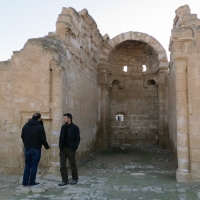 The tour through the city continues and brings us at a shop for copies of our passports. Hamad enters with Peter and when Peter wants to pay for the copies Hamad steps forward and pays instead. Peter cannot make him change his mind. Then they bring us to a cafeteria in the city. It is a large room with great lounge chairs. We order ’Kentucky chicken’ and get delicious chicken, salad, fries and bread with humus. When I look around I only see men in the restaurant, no women. I actually have to go to the bathroom and see a staircase going up into the corner of the room. Maybe that staircase leads to the women’s section where the ladies normally sit. I walk to Mustafa to ask if the ladies toilet is upstairs. He says that there really are not many women that visit the restaurant, there is no separate bathroom. When I ask if it is appropriate for me to go to the men’s room, he apologizes and lets me know that is not really appropriate. Nevertheless he gets up to ask the staff. After they have verified that the lock on the door works, I can still use the toilet. Great! After the delicious meal, which we again cannot pay ourselves, we walk back towards the car. Next to the restaurant we see a supermarket. We decide to do some shopping for the next day. Hamad Mustafa and walk with us. If it turns out that we actually only need bread, Mustafa explains we can buy bread the next morning when we go to Tobruk. Fresh bread is perhaps tastier so we leave the shop without bread and with the intention to buy it the next morning. When we are back in the car again, we drive about 500 metros when Hamad stops the car in front of some stores. He gets out and comes back a few minutes later with a large bag full of….bread! As we continue driving, Hamad stops again at some stores. Those stores all sell hardware, like tools and building materials. After we have been to four stores (without Hamad buying something) Peter and I suddenly realize what he is looking for: jerry cans for benzine. Only now we see that Hamad is actually doing our shopping for us! Hamad ultimately does not succeed to finding the jerrycans. We are glad he did not, because we feel a bit awkward. When we asked for their help in finding the stores, we never meant for them to buy us the stuff we needed.
The tour through the city continues and brings us at a shop for copies of our passports. Hamad enters with Peter and when Peter wants to pay for the copies Hamad steps forward and pays instead. Peter cannot make him change his mind. Then they bring us to a cafeteria in the city. It is a large room with great lounge chairs. We order ’Kentucky chicken’ and get delicious chicken, salad, fries and bread with humus. When I look around I only see men in the restaurant, no women. I actually have to go to the bathroom and see a staircase going up into the corner of the room. Maybe that staircase leads to the women’s section where the ladies normally sit. I walk to Mustafa to ask if the ladies toilet is upstairs. He says that there really are not many women that visit the restaurant, there is no separate bathroom. When I ask if it is appropriate for me to go to the men’s room, he apologizes and lets me know that is not really appropriate. Nevertheless he gets up to ask the staff. After they have verified that the lock on the door works, I can still use the toilet. Great! After the delicious meal, which we again cannot pay ourselves, we walk back towards the car. Next to the restaurant we see a supermarket. We decide to do some shopping for the next day. Hamad Mustafa and walk with us. If it turns out that we actually only need bread, Mustafa explains we can buy bread the next morning when we go to Tobruk. Fresh bread is perhaps tastier so we leave the shop without bread and with the intention to buy it the next morning. When we are back in the car again, we drive about 500 metros when Hamad stops the car in front of some stores. He gets out and comes back a few minutes later with a large bag full of….bread! As we continue driving, Hamad stops again at some stores. Those stores all sell hardware, like tools and building materials. After we have been to four stores (without Hamad buying something) Peter and I suddenly realize what he is looking for: jerry cans for benzine. Only now we see that Hamad is actually doing our shopping for us! Hamad ultimately does not succeed to finding the jerrycans. We are glad he did not, because we feel a bit awkward. When we asked for their help in finding the stores, we never meant for them to buy us the stuff we needed. 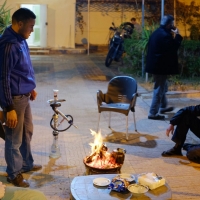 When we come back to the ‘farm’ Fergany lights the fire pit. Hamad fills the table with nuts, cakes and drinks. On the fire there is a tea pot with hot water for tea . The remainder of the evening we all sit around the fire and we talk, with translation of Mustafa, with Hamad and Fergany. A lovely evening!! The next morning at 08:00am we have packed and are ready to leave. But the table is set for breakfast with the bread Hamad bought yesterday. Hamad and Fergany are making tea in the kitchen. We enjoy the great breakfast! When we all had enough to eat and walk back to our bike, on each bike lie two apples, two bananas and two bottles of water for the road. What a host! In front of our bike a large white Toyota Landcruiser is parked. We notice it is heavily loaded. When we admire the car Hamad shows us that there are two huge 60-liter jerry cans filled with benzine in the back of the car. He managed to get benzine after all. However, these cans are too big to take with us on the bikes. Hamad explains that this is not a problem because he will be going with us! He will ride 200km with us to Tobruk until halfway the desert road. There we will meet his friend, who will take us the next 200km to Tobruk. The fuel in the car is for halfway. We do not know what to say about this infinite hospitality, unbelievable!
When we come back to the ‘farm’ Fergany lights the fire pit. Hamad fills the table with nuts, cakes and drinks. On the fire there is a tea pot with hot water for tea . The remainder of the evening we all sit around the fire and we talk, with translation of Mustafa, with Hamad and Fergany. A lovely evening!! The next morning at 08:00am we have packed and are ready to leave. But the table is set for breakfast with the bread Hamad bought yesterday. Hamad and Fergany are making tea in the kitchen. We enjoy the great breakfast! When we all had enough to eat and walk back to our bike, on each bike lie two apples, two bananas and two bottles of water for the road. What a host! In front of our bike a large white Toyota Landcruiser is parked. We notice it is heavily loaded. When we admire the car Hamad shows us that there are two huge 60-liter jerry cans filled with benzine in the back of the car. He managed to get benzine after all. However, these cans are too big to take with us on the bikes. Hamad explains that this is not a problem because he will be going with us! He will ride 200km with us to Tobruk until halfway the desert road. There we will meet his friend, who will take us the next 200km to Tobruk. The fuel in the car is for halfway. We do not know what to say about this infinite hospitality, unbelievable! 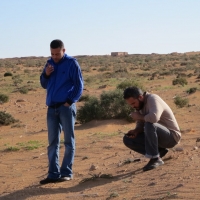 Hamad and Fergany ride in front of us in the Landcruiser and lead us through the busy city of Ajdabiya to the desert road towards Tobruk. After we have done about 20km Hamad parks his car on the side of the road. He says something about a Toyota Hilux, a ‘ friend’ and the police. Unfortunately, we do not understand him. Hamad and Fergany both get out and start calling people. After half an hour, just after Hamad has again spoken on the phone to someone, he gets up again: “It ‘s OK, we go now.” We are not entirely clear yet what was the reason for the break, but we understand that we can go again. The route we drive is mostly boring. The road is literally a straight line from Ajdabiya to Tobruk without curves. On either side is only desert as far as the eye can see. Our bikes do not have a very strong engine, so we drive at a fixed rate of 90km per hour towards Tobruk. The only distraction is the CD of Ben Howard on my phone that I can listen using my headset. Billy and Ross, who have very strong and much faster motorbikes, are even more bored. They could have ridden towards Tobruk at high speed, but keep our pace all the way. Billy occasionally leaves the asphalt road to drive on the gravel road that runs parallel. Ross tries to ride standing with no hands while using the cruise control gadget. While Peter and I plow to Tobruk at the same speed, we see them wandering around us and sometimes overtake us with great speed, just for fun.
Hamad and Fergany ride in front of us in the Landcruiser and lead us through the busy city of Ajdabiya to the desert road towards Tobruk. After we have done about 20km Hamad parks his car on the side of the road. He says something about a Toyota Hilux, a ‘ friend’ and the police. Unfortunately, we do not understand him. Hamad and Fergany both get out and start calling people. After half an hour, just after Hamad has again spoken on the phone to someone, he gets up again: “It ‘s OK, we go now.” We are not entirely clear yet what was the reason for the break, but we understand that we can go again. The route we drive is mostly boring. The road is literally a straight line from Ajdabiya to Tobruk without curves. On either side is only desert as far as the eye can see. Our bikes do not have a very strong engine, so we drive at a fixed rate of 90km per hour towards Tobruk. The only distraction is the CD of Ben Howard on my phone that I can listen using my headset. Billy and Ross, who have very strong and much faster motorbikes, are even more bored. They could have ridden towards Tobruk at high speed, but keep our pace all the way. Billy occasionally leaves the asphalt road to drive on the gravel road that runs parallel. Ross tries to ride standing with no hands while using the cruise control gadget. While Peter and I plow to Tobruk at the same speed, we see them wandering around us and sometimes overtake us with great speed, just for fun. 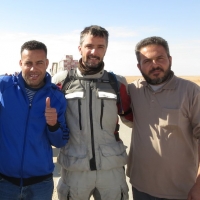 When we are almost halfway Hamad stops the car. From the opposite direction another two cars stop. Hamad greets his friend and introduces us to our new escort. Before we go on the road all four bikes are filled with benzine from the jerrycan in the back of Hamads car. Then we say goodbye Fergany and Hamad . A special moment because we again have the feeling we say goodbye to very good friends. When Fergany and Hamad are almost in their car, they walk back towards us and give each of us a photo of themselves. After a final group picture we go on our way again. The second half of the route is not much different than the first half except that it is possibly even more boring. Ben Howard sings now the same song for the third time and the acts of Billy and Ross are becoming more and more exciting. At some point Billy rides at high speed through the desert along with a Landcruiser pickup from the arm . When the GPS indicates that we are almost in Tobruk some cars ride towards us honking. Our escort stops and greets the men in the oncoming car. The newly arrived men introduce themselves as Moosa and Hameed. Hameed is a member of the motorcycle club from Tobruk and gives us all a large sticker with their logo for on our bikes. Moosa and Hameed will help us to find a hotel in Tobruk. The soldiers that were in the Landcruiser now also join us. Again everyone takes their phone to take pictures an make little films.
When we are almost halfway Hamad stops the car. From the opposite direction another two cars stop. Hamad greets his friend and introduces us to our new escort. Before we go on the road all four bikes are filled with benzine from the jerrycan in the back of Hamads car. Then we say goodbye Fergany and Hamad . A special moment because we again have the feeling we say goodbye to very good friends. When Fergany and Hamad are almost in their car, they walk back towards us and give each of us a photo of themselves. After a final group picture we go on our way again. The second half of the route is not much different than the first half except that it is possibly even more boring. Ben Howard sings now the same song for the third time and the acts of Billy and Ross are becoming more and more exciting. At some point Billy rides at high speed through the desert along with a Landcruiser pickup from the arm . When the GPS indicates that we are almost in Tobruk some cars ride towards us honking. Our escort stops and greets the men in the oncoming car. The newly arrived men introduce themselves as Moosa and Hameed. Hameed is a member of the motorcycle club from Tobruk and gives us all a large sticker with their logo for on our bikes. Moosa and Hameed will help us to find a hotel in Tobruk. The soldiers that were in the Landcruiser now also join us. Again everyone takes their phone to take pictures an make little films. 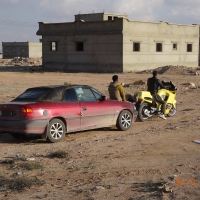 It is not so far to Tobruk anymore. As we enter Tobruk, more and more cars add our group. Some are people from the motorcycle club, others are just random passers-by who want to take pictures of their children with the bikes. One of the members of the club arrives on a big yellow BMW motorcycle. He wants to ride along with us, but unfortunately the bike does not want to start. No problem, they know a solution: “Hit by car”. One of the men sits on the hood of a car and puts his legs forward against the back of the bike. This way they try to push-start the BMW or at least push it to a garage. Before we go to a hotel, the guys would like to take us to the Commonwealth Cemetery of Tobruk where victims of the Second World War are buried. Even though we are all very tired of the long boring day on the bike, we cannot say no and are happy to follow them. The Commonwealth Cemetery is well maintained and a great contrast to the dusty environment outside the fence. Most soldiers are from Australia, Great Britain, Poland and the Czech Republic (then Czechoslovakia). Most of them are not older than 26. Some tombstones have beautiful poems on them, from the parents, sisters or brothers of the victims, like: “No honors did he crave, we do not know his story, but we know he was brave.”
It is not so far to Tobruk anymore. As we enter Tobruk, more and more cars add our group. Some are people from the motorcycle club, others are just random passers-by who want to take pictures of their children with the bikes. One of the members of the club arrives on a big yellow BMW motorcycle. He wants to ride along with us, but unfortunately the bike does not want to start. No problem, they know a solution: “Hit by car”. One of the men sits on the hood of a car and puts his legs forward against the back of the bike. This way they try to push-start the BMW or at least push it to a garage. Before we go to a hotel, the guys would like to take us to the Commonwealth Cemetery of Tobruk where victims of the Second World War are buried. Even though we are all very tired of the long boring day on the bike, we cannot say no and are happy to follow them. The Commonwealth Cemetery is well maintained and a great contrast to the dusty environment outside the fence. Most soldiers are from Australia, Great Britain, Poland and the Czech Republic (then Czechoslovakia). Most of them are not older than 26. Some tombstones have beautiful poems on them, from the parents, sisters or brothers of the victims, like: “No honors did he crave, we do not know his story, but we know he was brave.” 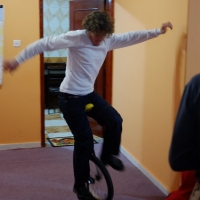 After we have visited the cemetery Moosa and Hameed take us to a recently renovated hotel. We get a hotel room on the top floor of the building with two bedrooms, a kitchen and a large living room. The rest of the afternoon we are passed out in the living room in front of the TV and over the map to see about the route we are going to ride in Egypt. At the beginning of the evening Moosa, Hameed and Moosas son return with dinner: freshly fried fish, soup, bread and humus. It tastes great! While eating Moosa explains that he is captain of the “Tourist Police”. He tells us about the current security situation. Only now we understand what the reason was that Hamad had stopped this morning for over half an hour. Hamad thought we were being followed by a Toyota Hilux and did not want to continue driving until he had made sure that it was safe! After a fun evening with more group photos and a demonstration of Ross on his unicycle, we dive into bed. Tomorrow awaits a new challenge, the Libyan border and then the Egyptian border, apparently one of the toughest border crossings in the world. At 7 o’clock in the morning we drive away from the car park of the hotel in Tobruk. The sun has only just risen and it is still pretty cold when we follow a colleague of Moosa of the tourist police towards the border. After about 100km we stop in a parking lot near the border. In the distance we can already see the gate we will drive through our of Libya and into Egypt. We hand in our Libyan license plates and give our passports to a lady who will assist us with the administration. After about an hour we get our passports back, as well as the deposit of 100 Libyan dinars per numberplate. That ‘s it, we can leave Libya and go to Egypt. –
After we have visited the cemetery Moosa and Hameed take us to a recently renovated hotel. We get a hotel room on the top floor of the building with two bedrooms, a kitchen and a large living room. The rest of the afternoon we are passed out in the living room in front of the TV and over the map to see about the route we are going to ride in Egypt. At the beginning of the evening Moosa, Hameed and Moosas son return with dinner: freshly fried fish, soup, bread and humus. It tastes great! While eating Moosa explains that he is captain of the “Tourist Police”. He tells us about the current security situation. Only now we understand what the reason was that Hamad had stopped this morning for over half an hour. Hamad thought we were being followed by a Toyota Hilux and did not want to continue driving until he had made sure that it was safe! After a fun evening with more group photos and a demonstration of Ross on his unicycle, we dive into bed. Tomorrow awaits a new challenge, the Libyan border and then the Egyptian border, apparently one of the toughest border crossings in the world. At 7 o’clock in the morning we drive away from the car park of the hotel in Tobruk. The sun has only just risen and it is still pretty cold when we follow a colleague of Moosa of the tourist police towards the border. After about 100km we stop in a parking lot near the border. In the distance we can already see the gate we will drive through our of Libya and into Egypt. We hand in our Libyan license plates and give our passports to a lady who will assist us with the administration. After about an hour we get our passports back, as well as the deposit of 100 Libyan dinars per numberplate. That ‘s it, we can leave Libya and go to Egypt. – 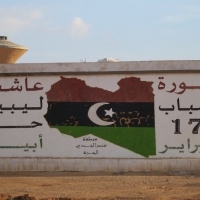 Leaving Libya is the end of our Libyan adventure. It was a very special week, with the most amazing meetings and again unlikely hospitality. Despite the media coverage about the problems that still plague the country, we have not felt unsafe at all. Whether that was correct is of course to be seen. Only a few days ago, (on January 3, 2014) two foreigners have been killed in Libya not far from Zuwara. I am however glad it did not stop us from visiting Libya. The country has an incredible amount to offer and we hope that we will visit again when the country is more stable. We want to thank Masaud (Tripoli), Salah, Abdel Hamid, Ali, Rahim, Mustafa, Hamad, Fergany, Moosa and Hameed very much for the wonderful time we had and the fact that we have been able to travel safely. We also want to thank Billy and Ross for travelling through Libya with us on a slightly slower pace. We loved your company! Above all we want to thank Masoud (of Tidwa from Zuwara). We know for sure that he has made our trip by helping us and by introducing us to such loverly people. Thank you very much!
Leaving Libya is the end of our Libyan adventure. It was a very special week, with the most amazing meetings and again unlikely hospitality. Despite the media coverage about the problems that still plague the country, we have not felt unsafe at all. Whether that was correct is of course to be seen. Only a few days ago, (on January 3, 2014) two foreigners have been killed in Libya not far from Zuwara. I am however glad it did not stop us from visiting Libya. The country has an incredible amount to offer and we hope that we will visit again when the country is more stable. We want to thank Masaud (Tripoli), Salah, Abdel Hamid, Ali, Rahim, Mustafa, Hamad, Fergany, Moosa and Hameed very much for the wonderful time we had and the fact that we have been able to travel safely. We also want to thank Billy and Ross for travelling through Libya with us on a slightly slower pace. We loved your company! Above all we want to thank Masoud (of Tidwa from Zuwara). We know for sure that he has made our trip by helping us and by introducing us to such loverly people. Thank you very much!
Distance to Libyan – Egyptian border : 5164km (3210 miles)





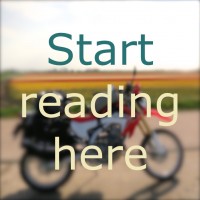
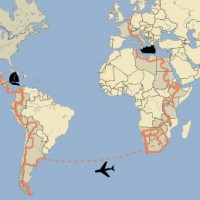
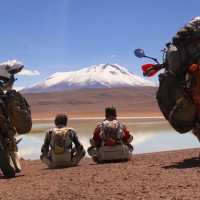
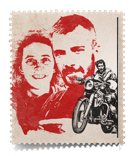
Hit by car op z’n libisch… inventief volkje. kan niet bestaat niet! En volgens mij is gastvrijheid uitgevonden in deze hoek van de wereld..Europa eat your heart out. Ongeloofelijk en geweldig! Ik heb nog genoeg heerlijk leesvoer voor de komende avonden deze week;top :), xxx
Wat prachtig om te lezen en wat ongelooflijk herkenbaar. Ooit hoop ik zullen meer mensen dit soort ervaren weten en onthouden. Het delen van ervaringen als die van jullie (ik doe mijn best) is ontzettend top. Wat betreft Libië. Het is inderdaad een ongelooflijk gastvrij land, met ongekend crazy, genereuze mensen. Mensen die bovenal ontzettend leergierig zijn en ontzettend willen veranderen. Iets waar ze overigens absoluut hulp bij nodig hebben (wat ze ook vragen).
Ik wens jullie een hele fijne en veilige reis, met prachtige nieuwe ervaringen.
Vrolijke groet,
Yvonne
Wij genieten ontzettend van jullie prachtig geschreven verhalen. Prettig dat de thuisblijvers nu ook via jullie facebookpagina, Amsterdam To Anywhere, tussen de blogberichten door op de hoogte kunnen blijven van jullie verblijfplaats.
Een heel veilige reis verder, geniet er van en vertrouw op je gevoel.
Liefs, pa en ma.
Hoi lieverds,
Ik wordt helemaal blij van jullie blog en alle positieve verhalen…. heerlijk om zo met jullie het avontuur mee te beleven. Schrijf vooral door !!
dikke kus Madeleine
Wat een leuke verhalen!
In gedachte reis ik mee.
groetjes en liefs Oma.
Wat hebben jullie hier veel meegemaakt en wat beschrijf je het goed! Dient die eenwieler van Ross om zijn financiën bij elkaar te sprokkelen? Grappig
Wat weer een bijzonder verhaal om te lezen! Zo en inderdaad… Oneindige gastvrijheid! Niet voor te stellen in onze samenleving!
X
Peter en Leonie,
Als eerste nog de beste wensen.
Wat een leuke verslagen om te lezen. Ik ben blij dat jullie de gok hebben durven wagen om door Libië te reizen. Ik denk dat jullie binnen 5000km echt met recht wereld burgers zijn geworden. Ik kijk met verwachting uit naar jullie volgend avontuur en blog. Groetjes Enrico.
Geweldig wat jullie tot dusver hebben meegemaakt, ik kijk al weer uit naar het volgende verhaal.
Dit is vanachter de tafel weg al genieten, en dat terwijl ik gewoon thuis ben.
ik bedoel GAAF
Wat gaf die escortes met benzine toe!!
Dikke knuffel
Weer een positief bericht ! Je schrijft boeiend. Wij genieten er van en leven met jullie mee. Veel geluk voor de volgende etappes. Gr. Ben en Anja
Wat een gastvrijheid, ook bijzonder hoe jullie je daarvoor openstellen! Blijft fijn om zo mee te kunnen lezen. Dikke kus
Ik wilde beginnen met het lezen van de ochtend krant, maar dit is veel leuker! Goede reis verder!
Wat fantastisch dat de mensen in Libië zo gastvrij voor jullie hebben gezorgd. Heel bijzonder en ook goed om eens een ander verhaal te horen over een land waarover ik dacht dat niet veel leuks te melden zou zijn! Xxx